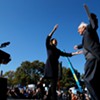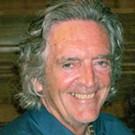Published August 9, 2000 at 4:04 p.m.
When future historians record how same-sex marriage came to be accepted in the United States, Tom Little’s role will warrant much more than a footnote. It will be recalled that in the year 2000 the Vermont legislature broke the taboo that had prevented gays and lesbians from entering into state-sanctioned unions. The chroniclers of the centuries-long struggle for equal treatment for all Americans will further note that the decisive battle over the civil-unions law was fought in the closely divided Vermont House. And the most insightful analysts will then point to an unassuming Republican lawmaker from Shelburne as the single most influential figure in steering the legislation to narrow passage.
Tom Little, they’ll say, was perfect for the part — politically and personally. Just as we credit the efforts and example of Illinois Republican Sen. Everett Dirksen for approval of the Voting Rights Act of 1965, Americans may one day realize that gay and lesbian marriage rights were won, in part, because a Vermont GOP leader helped persuade other moderate Republicans to vote on their conscience, not their fears.
Sitting in his St. Paul Street law office overlooking City Hall Park in
Burlington, Little, 46, makes no such claims for his work, The most he will say, three months after enactment of the civil-unions law, is that “someone at the left or right end of the spectrum probably would not have been able to put it all together.”
Others, however, do not hesitate to identify Little as the most influential of the 150 House members in determining the bill’s fate. First, he shepherded it through a key committee, the Judiciary; then he floor-managed the legislation to victory in a chamber where a majority had to be constructed vote by vote.
“Yes, Tom played a major role in the bill’s passage,” says Rep. Nancy Sheltra of Derby, a militant opponent of civil unions. This fellow Republican is so galled by Little’s success that she hopes to see him defeated in the party’s September primary.
Rod Fisher, Little’s challenger in that race, says he was motivated to run because of the incumbent’s high-visibility stance on civil unions. And Fisher, a 62-year-old retiree, apparently intends to make sexual preference an issue in the race. Although Little and his wife of 23 years have produced three children, Fisher insists his opponent “must be either homosexual or bisexual,” adding, “everybody who voted for the bill is either homosexual or bisexual.”
Little’s pivotal role is also acknowledged — in different terms — by those at the other end of the political spectrum. “He was absolutely the most influential in the direction the bill took,” says Rep. Steve Hingtgen, a Burlington Progressive. In his role as chairman of the House Judiciary Committee, Little “did the grunt work in getting the bill written, and he shaped the subtleties of it,” Hingtgen observes.
“Absolutely,” Freedom-to-Marry lobbyist Beth Robinson quickly replies when asked whether Little was the main factor in the passage of the civil-unions legislation. The 10-1 affirmative vote he helped engineer in the Judiciary Committee was “completely crucial” in assembling the 78-69 margin by which the bill cleared the full House.
Republican lawmaker John Edwards of Swanton calls Little’s leadership on the issue “masterful.” No one else in the House “had the skills and the respect” needed to handle so explosive a piece of legislation, remarks Edwards, a former state trooper who voted for the bill.
Subtlety is Little’s secret weapon, according to Hingtgen. Not only is the dose-cropped, buttoned-down attorney unobtrusive in his appearance, he’s so calm and considerate that “he can move legislation forward without much indication that it’s happening,” Hingtgen notes.
In the case of the civil-unions bill, Little took the time needed to develop a solid consensus among committee members. He listened patiently — to proponents of an outright same-sex marriage law as well as to legislators who did not want to go nearly that far.
Little says he wanted to proceed at the deliberative pace he believed essential to the bill’s success, but he also did not want to delay final action until next year’s session. He was worried that if the legislature failed to respond in a timely fashion to the Vermont Supreme Court’s December 1999 ruling on the Baker case, supporters of same-sex marriage would return to the court to demand it take the matter out of the hands of the House and Senate.
To avoid that outcome, which would have been widely viewed as antithetical to the democratic process, Little had to employ psychological as well as political skills.
“I was initially concerned with establishing a thoughtful atmosphere in the committee so that members could discuss the issue without too much self-consciousness,” he explains. By “issue,” Little means “sexuality.” And he understood that many of his colleagues shared his own reluctance to discuss the subject.
“I’ve always had a difficult time talking about any kind of sexuality,” Little admits. “That’s something private.” But for him and other committee members, Constitutional concerns came to transcend personal inhibitions.
Little’s own respect for Supreme Court rulings verges on reverence. Once the court decided in the Baker case that Vermont was violating the equal-benefits clause of its Constitution, he became fully committed to providing lesbian and gay couples with the same protections enjoyed by heterosexual married partners.
To Little, it was a straightforward civil-rights issue. “If someone’s sexual orientation is not established at birth, it is established soon after,” he reasons. “And if sexual orientation is not quite the same as the pigment of one’s skin, it’s close enough.”
Little says his own attitude toward sexual orientation was strongly influenced by Bill Lippert, an openly gay legislator who has served on the Judiciary Committee for the past five years. “The more people can come to know individuals who are gay or lesbian without focusing on their sexuality, the more people can accept them as human beings,” Little comments.
The round of public hearings on the civil-unions legislation was “a watershed event” that changed the perceptions of many lawmakers, he adds. Often at these sessions, “someone would stand up and say, ‘Here I am. You know me. I’m your neighbor.’ It put a human face on the issue,” Little notes.
But as much as he was affronted by homophobic discrimination, Little not willing to erase all legal distinctions between gay and straight. Specifically, he refused to craft a bill giving unequivocal endorsement to same-sex marriage.
“Vermont, as a political culture and a social culture, wasn’t ready for same-sex marriage,” in Little’s judgment.
Lobbyist Robinson is careful to point out that the civil-unions legislation that Little did write was “not our bill.” It was “a good piece of compromise legislation,” she adds, “but it was still a compromise.”
Little’s bill, however, does come closer to what same-sex marriage advocates favor than did suggested alternatives that might have been considered consistent with the Supreme Court’s ruling.
Little insisted that the legislation be tailored to gays and lesbians. He could have tried to fudge it by making civil-union status available to heterosexuals and homosexuals alike, as has been done in France. But that solution presented Constitutional difficulties, Little believes. It would have afforded straight couples two options — marriage or civil union — while gays and lesbians would be limited to one.
In addition, Vermont heterosexual couples had not gone to court to complain of discriminatory treatment, he points out.
“I realize there are many heterosexual Vermonters who don’t like the institution of marriage because of its historical baggage,” Little says. “But they do have the right to join in a simple civil ceremony. Gays and lesbians didn’t have that right.”
Rep. George Schiavone, a Republican representing another part of Shelburne, faults Little for refusing to extend civil-union rights to non-homosexual, same-sex couples, such as a son and a widowed father or two elderly sisters who live together.
“Tom was driven to get the thing through, his way,” Schiavone says. “He was determined to set up a ceremony parallel to marriage.”
Calling the arrangement “domestic partnership” might also have assuaged the anxieties of a larger number of lawmakers. Again, though, Little and other committee members were insistent on the “civil union” coinage. “Domestic partnership had connotations of hired help in the home,” the Judiciary chairman says. “We also wanted to distinguish what we were doing from the domestic-partnership legislation that has passed in other states.”
Despite his pioneering performance, Little does not think he is far in front of his constituents in promoting legal recognition of same-sex unions. Most Shelburne voters with whom he has spoken approve of his position, Little says.
Schiavone, leader of the House opposition to the bill, has a different reading of sentiment in the same town. “I feel I represent what’s probably a majority on this issue,” he says. “I sense that I’m not running against a major tide.”
Schiavone concedes, however, that Little is unlikely to lose next month’s primary on this single issue. Given the strategy of Little’s opponent, that seems a reasonable assessment.
If Little survives Fisher’s challenge, he can glide to a fifth term in office. No Democrat has run against Little in the last three elections, and none is seeking to unseat him this November.
A native Vermonter and the son of a former state legislator, Little is a good match for the moderate and generally affluent district he represents. He and his wife Susan, an English-as-a-second-language instructor at St. Michael’s College, live on a six-acre property on Bostwick Road. Tom attended Bowdoin College and Cornell Law School.
His own politics were shaped to a large degree by his Republican parents, he says. Elaine Little was a planning commissioner in Burlington, while George Little, owner of the printing company that bore his name, served five terms in the state Senate and two in the House.
“There was never any talk between us of him being my successor,” George Little says. The father’s views are similar to the son’s on most issues, with George likening his own traditional brand of Vermont Republicanism to that of Sen. George Aiken.
There are conservative aspects of that legacy, notes Progressive legislator Steve Hingtgen. “Tom is seen as a very liberal Republican,” he says, “but on economics he’s true-blue. Even on a lot of environmental issues, he’s on the traditional Republican side.”
Susan Little, whose ancestral Vermont roots go at least as deep as her husband’s, meanwhile describes herself as a political independent. Her own father was a staunch FDR Democrat, and she says she never doubted that civil union equates with civil rights. Temperamentally, Susan says she qualifies as the “yang“ to Tom’s “yin.“
Indeed, “calm” is the adjective perhaps most frequently applied to Little by his political colleagues. “Stolid” and “lawyerly” seem accurate modifiers as well.
“What I like to do most,” Little says of his law practice, “is to help people solve complicated problems.” He specializes in the buying, selling and refinancing of small businesses.
Little also derives great satisfaction from “building a strong factual background for legislation. I really like writing legislation,” he says.
For now, he’s content to practice that arcane art in the House. Although he might have been a ready-made replacement for moderate Republican Helen Riehle, who’s stepping down from her Chittenden County state Senate seat, Little says he has no interest in serving in the upper chamber.
Senators get spread too thin, as they serve on two or three committees, Little suggests. He prefers the “more focused” alternative of having to sit on only one committee in the House. Besides, giving up his Judiciary Committee chairmanship and having to enter a Chittenden County musical chairs-style Senate race are of limited appeal.
That doesn’t mean Little won’t run for higher office, however. He’s open-minded, he says with characteristic caution, about the possibility of leapfrogging into a statewide race.
Governor Little?
Perhaps future historians will have to add that honorific as they recount the career of the man who wrote Vermont’s most revolutionary piece of social legislation.
Tom Little provides legal counsel for Seven Days.
More By This Author
Speaking of...
-

Totally Transfixed: A Rare Eclipse on a Bluebird Day Dazzled Crowds in Northern Vermont
Apr 10, 2024 -

Approaching Three Decades, Shelburne’s Dutch Mill Diner Gets a Refresh
Mar 12, 2024 -

Electra's Restaurant in Shelburne Has Something for Everyone
Mar 5, 2024 -

Apoc-eclipse Now: Scenes From an Eclipse Planning Meeting in Shelburne
Feb 5, 2024 -

New Owners Reopen Barkeaters in Shelburne
Nov 28, 2023 - More »
Comments
Comments are closed.
From 2014-2020, Seven Days allowed readers to comment on all stories posted on our website. While we've appreciated the suggestions and insights, right now Seven Days is prioritizing our core mission — producing high-quality, responsible local journalism — over moderating online debates between readers.
To criticize, correct or praise our reporting, please send us a letter to the editor or send us a tip. We’ll check it out and report the results.
Online comments may return when we have better tech tools for managing them. Thanks for reading.














































